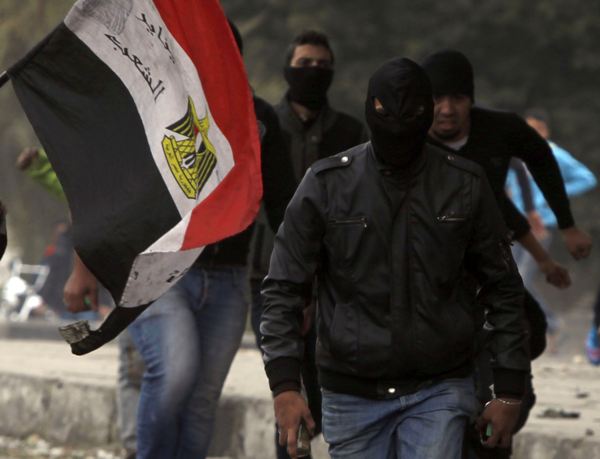
I was sitting in a café just 400 meters from Tahrir Square waiting for a friend who was attending one of his leftist political meetings. On the way to the cafe, I had watched demonstrators seize a police armored vehicle and drive it to the center of the square where they celebrated their spoils for a couple of minutes and then set it on fire.
My friend arrived carrying a copy of a party’s internal publication. It contained two articles on the debate preoccupying the party: whether the party and revolutionary movements should withdrawal from the National Salvation Front (NSF) because it includes feloul [remnants of the former regime] or instead form another alliance with revolutionary movements and parties within the front. While we were debating both of these positions, future prospects, and solutions in a deep, elitist discussion, a large demonstration crossed the street in front of us, among them what appeared to be members of the Black Bloc.
It was about 1:00am and the weather was cold. Yet, the demonstrators were walking down Tahrir St and spreading beyond Tahrir Square as far as the eye could see. They were chanting against President Morsi and the Muslim Brotherhood. And you could notice guys from Black Bloc surrounding the demonstrators
I walked with the demonstration in an attempt to understand the reasons for their leaving Tahrir Square. I asked one of them:
“Where are you going?”
He responded with incomprehensible, revolutionary zeal:
“The governorate building”
His response surprised me. While governorate buildings represent the power against which the masses are revolting, demonstrations in their vicinity only take place in cities and towns outside of Cairo. In the capital, on the other hand, it is pointless to go to the governorate building if one can head to parliament or the presidential palace.
His response was all the more surprising because the Cairo governorate building is a mere 200 meters from President Morsi’s Abdeen Palace. If the demonstration was calling for Morsi’s fall, I couldn’t understand why it was going to the governorate building instead of his palace. As I walked with the demonstration, I noticed a half-page statement had been distributed among the demonstrators. Everyone was passing it around and reading it with interest. Because I did not see a single person toss it aside, I asked someone to see it and he proudly gave it to me.
The short statement called for the fall of the Muslim Brotherhood. According to the claims of the statement’s authors, the American embassy had told the Israeli newspaper Maariv that the United States supports the Muslim Brothers because they want the Jews to return to Egypt to help fulfill the Jewish dream of an Israeli state extending from the Euphrates to the Nile. The evidence for this claim are the recent remarks from the Muslim Brotherhood leader Essam al-Erian and that the Muslim Brotherhood will strive to cause conditions in Egypt to deteriorate so that poverty will strike the country until Egyptians beg for the Jews to return and save them. The statement concluded with a quote from the American ambassador, “The Egyptians fight each other every day and don’t bathe, just the opposite of the Jews who love each other.”
Welcome to the depths of Egyptian populism.
I did not need to consult the Internet to confirm that these were fabricated statements. But I was amazed by the conspiratorial mentality, which appears to be deeply rooted in all Egyptian political currents.
Historically and to date, the Islamist currents are the pioneers of rumors and exaggerations supporting conspiracy theories that range from absolute faith in the Protocols of the Elders of Zion to blind confidence that September 11 was a ruse engineered by Americans to attack Islam. But now, however, this matter is no longer limited to the political Islamist movements. Even demonstrations described as “opposition” or expressive of a civil state have ample space for such ideas and legends, which fuel popular frustration.
While the square and the streets are saturated with these legends and myths, we see ElBaradei and the NSF bitterly repeating their refusal of dialogue. But amid the European Union and the United States indicating that the opposition should resort to dialogue and avoid mobilizing in the street, ElBaradei moves to ally with the extreme right (the Salafi current), accepts dialogue, and condemns the use of violence. His actions occurred without condemnation or mention of police accountability or the police violence that has killed more than fifty people among them children and the disabled in three days without a single policeman or police officer being brought to trial. It was not until more incidents of alleged torture emerged that he broke his silence on the aggression.
In the midst of the narrow-mindedness of the opposition’s political elite, its repeated kowtowing to Western states, its avoidance of any regulatory role for a mass movement in Tahrir Square, and leaving youthful demonstrators prey to rape, harassment, and thuggery, it is natural for groups like the Black Bloc to appear. Groups like these find victory and purpose in violence and targeting the authority’s economic interests especially given that the elderly and cowardly dominate the civil opposition’s political scene.
The extent of the self-indulgence reached by the civil political elite, foremost among them ElBaradei and Hamdeen Sabahy, is distressing. They meet with representatives of the Muslim Brotherhood, Salafi currents, and the Sheikh of al-Azhar in order to issue a statement in which they pledge to “remove political cover from any group that resorts to violence.” It is as if these youths should die silently, smiling at bullets from Morsi’s Interior Ministry – all for the sake of redrawing the electoral districts.
Ahmed Naje, a writer and journalist, works as an editor in the literary weekly Akhbar al-Adab.
Photo: Reuters
Image: Black%20Bloc%20Reuters.jpg

